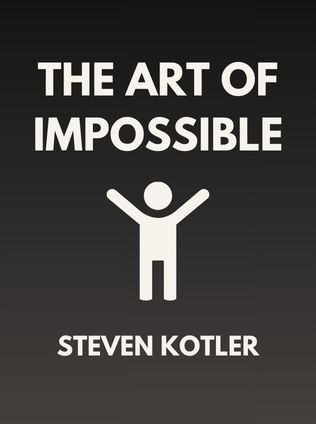
The Art of Impossible
A Peak Performance Primer
By Steven Kotler
Published 01/2021
About the Author
Steven Kotler is a bestselling author, award-winning journalist, and one of the world's leading experts on human performance. Over the years, Kotler has explored the boundaries of what is possible for humans, pushing the limits in fields as diverse as action sports, neuroscience, and technology. His work has been featured in over 100 publications, including The New York Times, The Wall Street Journal, TIME, and Forbes. Kotler’s interest in peak performance is not just academic; he is deeply committed to understanding and sharing the science behind extraordinary achievements. His books, including "The Rise of Superman" and "Bold," have become must-reads for anyone looking to enhance their capabilities and achieve greatness. In "The Art of Impossible," Kotler brings together decades of research to provide a roadmap for achieving what many consider unattainable, proving that the impossible is often just a matter of perspective and methodology.
Main Idea
"The Art of Impossible" posits that the journey to achieving extraordinary feats—those that seem impossible at first glance—is grounded in science, particularly the science of neurobiology. Kotler argues that peak performance is not an innate talent reserved for a few but a skill that can be developed through specific practices and habits. Central to this process is understanding the neurochemicals that drive motivation, focus, and creativity. By leveraging these biological tools, individuals can cultivate a state of full engagement, often referred to as "flow," which is crucial for pushing beyond current limits and realizing ambitious goals. The book outlines a systematic approach to building and sustaining this state of flow, making the seemingly impossible not only achievable but inevitable for those who follow the process.
Table of Contents
- Introduction
- Part 1: Neurochemicals Drive Peak Performers to Succeed
- Part 2: A Step-by-Step Process to Achieve Full Engagement
- Conclusion
Introduction
The concept of impossibility is one that has fascinated humans for centuries. Whether it's climbing the highest mountains, solving complex scientific problems, or pushing the boundaries of art and creativity, history is replete with examples of individuals who have achieved what was once deemed impossible. In the introduction to "The Art of Impossible," Steven Kotler sets the stage by challenging the reader's perception of impossibility. He argues that the notion of something being impossible is often more about the limits of our current understanding and less about the actual feasibility of the task.
Kotler introduces the idea that achieving the impossible is not about possessing superhuman abilities but about systematically developing the right mindset and habits. He underscores the importance of having a clear understanding of the science that underpins peak performance, particularly the role of neurochemicals. By breaking down these scientific principles into actionable steps, Kotler aims to empower readers to transcend their perceived limits and achieve extraordinary goals.
Part 1: Neurochemicals Drive Peak Performers to Succeed
The Role of Neurochemicals in Peak Performance
At the heart of Kotler’s thesis is the idea that neurochemicals play a crucial role in driving peak performance. Neurochemicals are substances in the brain that influence everything from our mood and focus to our ability to learn and process information. In "The Art of Impossible," Kotler identifies six key neurochemicals that are particularly important for achieving peak performance: dopamine, norepinephrine, oxytocin, serotonin, endorphins, and anandamide.
Each of these neurochemicals has a specific function:
Sign up for FREE and get access to 1,400+ books summaries.
You May Also Like
The Subtle Art of Not Giving a F*ck
A Counterintuitive Approach to Living a Good Life
By Mark MansonRich Dad Poor Dad
What the Rich Teach Their Kids About Money - That the Poor and Middle Class Do Not!
By Robert T. KiyosakiHow To Win Friends and Influence People
The All-Time Classic Manual Of People Skills
By Dale CarnegieFreakonomics
A Rogue Economist Explores the Hidden Side of Everything
By Steven D. Levitt and Stephen J. Dubner



















